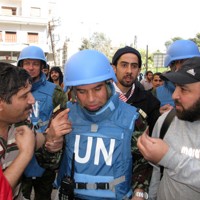Editor's note: Ulrike Guérot is on a two-week break. Guest columnist Richard Gowan will be writing the Continentalist while she is gone.
The Syrian civil war is becoming simultaneously more brutal and more confusing. As the battle for Aleppo has dragged on and diplomatic efforts to forge a peace deal have been derailed, it has been hard to assess whether Syrian President Bashar al-Assad and his regime are close to collapse or able to sustain a protracted war. Yet there is a growing sense that, if and when Assad falls, some sort of international peacekeeping force will likely be needed to prevent Syria from descending into worse chaos.
Such a force would not be a light, unarmed observer operation like the current United Nations Supervision Mission in Syria, which is on the verge of closure. As former British army officer Richard Kemp argued in a recent report, “The objective would be to monitor and identify causes of conflict; and mediate, negotiate and -- when necessary -- apply military force to prevent escalation of tension or resumption of hostilities.” Kemp added that only a “powerfully armed force” could fulfill these goals.

